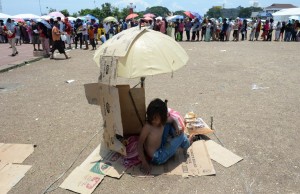DSWD faces probe for neglecting Zamboanga siege evacuees
MANILA, Philippines — The House of Representatives will conduct a probe on the Department of Social Welfare and Development’s (DSWD) failure to bring aid to close to thousands of homeless people in Zamboanga City who were displaced by three weeks of gunfire and shelling between the military and the Moro insurgents 10 months ago despite massive funds allocated by Congress to improve their welfare.
Bayan Muna Partylist Representative Carlos Isagani Zarate said that the DSWD should take responsibility for “the appalling humanitarian condition” of internally displaced persons (IDPs) in Zamboanga City in evacuation centers built by the agency.
“The Aquino government should reassess its priorities. It must be accountable for its continuing negligence in providing to basic social services and immediate permanent housing to the people displaced by the September Zamboanga siege,” said Zarate.
Zarate filed a bill seeking an investigation by the House Committee on Social Services of the DSWD’s mismanagement of the evacuation centers, including what the government did with the P14 billion as supplemental fund for the rehabilitation and reconstruction of devastated areas due to natural and man-made calamities, including the aftermath of the Zamboanga siege, allocated by Congress in 2013.
Zarate noted that despite this allocation (as well as the P20 billion Rehabilitation and Reconstruction Program Fund, P13 billion from the National Disaster and Risk Reduction Management Fund, and a stand-by P80 billion unprogrammed fund for reconstruction and rehabilitation earmarked by Congress this year), the IDPs still have no permanent housing, lack food support and rice supply, medical support, and financial support and sources of livelihood.
Article continues after this advertisementZarate estimated that 23,794 families or 118,819 persons were affected by Moro National Liberation Front chair Nur Misuari’s ill-fated attempt to control Zamboanga City and they have continued to suffer over the last 10 months due to the DSWD’s “gross inefficiency.”
Article continues after this advertisementIn a report released last week, the Internal Displacement Monitoring Center (IDMC), a Swiss-based nongovernment organization, said: “Almost all (IDPs) belong to Muslim groups, including indigenous groups, who represent a minority in the largely Christian city. Some 38,000 people are reported to be living with host families in the city, while some 26,000 men, women and children remain in camps and other temporary structures.”
Zarate said at least 138 persons have already passed away since September 2013, including three-year-old boy Ferji Usman, a Badjao child transferred to the Cawa-cawa evacuation center, who died due to malnutrition June 21, and another 12-year-old boy whodied of tuberculosis last March 23.
Aside from ailments due to unsanitary conditions in the evacuation centers, Zarate said there have been reports of rape and sexual abuse of minors in the evacuation sites that were ignored by authorities.
“The Aquino administration should be made to pay for the deaths of these innocent people due to its failure to provide basic social services such as clean water, a livable home, and a relocation site with job opportunities We have witnessed that the IDPs have not been allowed to return to their previous homes due to the government’s `no build zone policy’ as demanded by big businessmen,” said Zarate.
The IDMC noted that the “building back better” reconstruction and rehabilitation plan adopted by President Aquino last December but only started to be implemented in May was the “main obstacle” to solving the Zamboanga situation, which it said was reaching “critical levels.”
“The plan is largely focused on physical reconstruction but neglects issues of economic recovery and compensation for lost property. IDPs have been told that they cannot return before it is finalised. The plan is also seen as unrepresentative at best and discriminatory (against informal settlers) at worst. While nearly 10,000 homes were almost totally destroyed, the government plans to only build 5,581 new houses and support 1,661 families to rebuild their homes – leaving a shortfall of some 30 percent left to go without,” said IDMC.
RELATED STORIES
Death continues to hound Zamboanga siege refugees
Zamboanga siege evacuee arrested after posting ‘no to relocation’ signs outside tent
